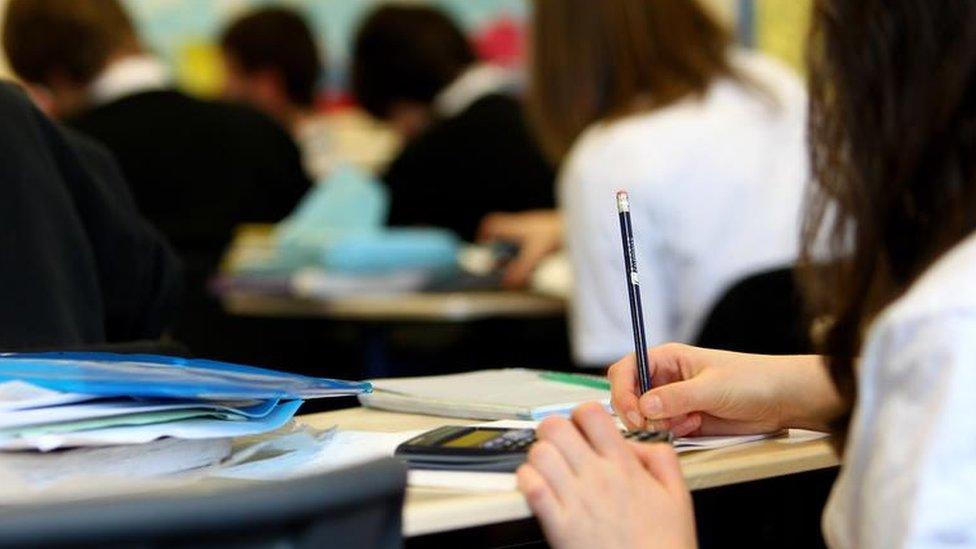Thousands of bright pupils let down, says Ofsted
- Published

More than a quarter of able pupils did not make minimum expected progress
Thousands of bright pupils, especially those from poor backgrounds, are still being denied the chance to fulfil their potential, says the head of Ofsted.
Sir Michael Wilshaw said despite the education watchdog's efforts to stretch the brightest children, little progress has been made in England's schools.
He highlighted how gifted children from poor homes entitled to pupil premium money were still lagging well behind.
The government says there are 1.4m more pupils in top-rated secondary schools.
Sir Michael says: "The most recent statistics paint a bleak picture of underachievement and unfulfilled potential.
"Thousands of our most able secondary-age children are still not doing as well as they should be in the non-selective state sector where the vast majority of them are educated."
He said that last year, 27% of previously high-attaining pupils had failed to even achieve the minimum expected progress - a grade B in both English and maths at GCSE.
'Depressing'
"These figures reflect the lack of ambition our inspectors still find in many secondary schools," he said.
He continued: "What is most depressing is that the brightest children from disadvantaged backgrounds are the most likely not to achieve their full potential.
"The most able children in receipt of pupil premium funding still lag well behind their more advantaged peers."
It was a scandal that the achievement gap between free school meals pupils and those not on free meals at age 16 had barely shifted in a decade, he added.
He said the government understood that this issue was a serious and pressing one and had introduced tougher tests in primary schools.
This had helped narrow the gap between poorer pupils and their peers, by helping teachers identify when children were falling behind, he claimed.
'Unlock potential'
He blamed the lack of national tests, in the early years of secondary schools, for the fact that many pupils are "left to flounder" during what Ofsted dubbed "the wasted years of Key Stage 3" (Years 7 to 9).
Sir Michael called for the reinstatement of national tests at age 14, which were scrapped by the Labour government in 2008.
"I firmly believe that it was a mistake to abolish these tests in the first place.
"If we are serious about helping all disadvantaged children, but especially the most able, to learn well and unlock their full potential, we need to know how they are doing at 14 as well as at seven, 11 and 16."
The Department for Education said: "Like Sir Michael Wilshaw, we recognise that more needs to be done to ensure the most able children fulfil their vast potential.
"That is why we are introducing new world-class GCSEs that will stretch the brightest pupils.
"Alongside this, academies and innovative free schools, such as the King's Maths School, which offers young mathematicians and scientists the opportunity to study alongside leading academic experts, are giving every child the opportunity to fulfil their potential.
"However, we are not complacent and that is why our recent White Paper goes even further by committing to investigating and funding approaches to help even more bright children fulfil their vast potential."
'Rhetoric'
Shadow education secretary Lucy Powell MP said: "Stretching all children to achieve the highest they can achieve is what parents and society want.
"Despite the government's rhetoric, many of their actions are taking this backwards.
"They've caused chaos in primary testing and abolished the hardest test. They are narrowing the curriculum and putting more and more focus on an increasingly narrow set of measures for schools and they've caused a crisis in teacher recruitment."
Malcolm Trobe, interim general secretary of the Association of School and College Leaders, said: "Subjecting children to even more testing and schools to even more sanctions is not a panacea to every challenge."
- Published13 June 2013